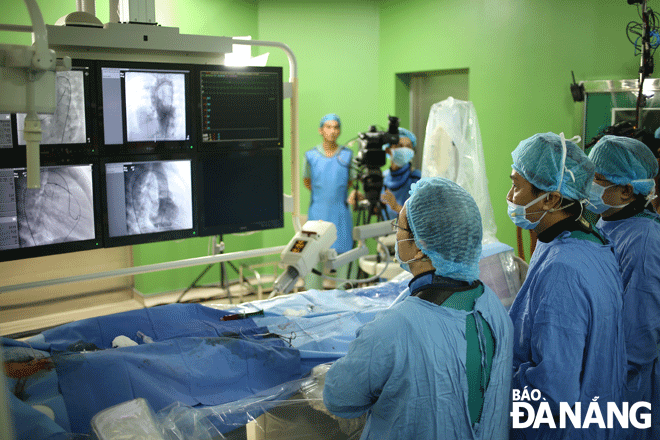Developing a synchronous and modern health system
Over the past 25 years, Da Nang’s healthcare sector has gained numerous important and comprehensive results in enhancing the quality of healthcare services, reducing morbidity and mortality rates, and improving quality of life for local habitants. Also, the city's health system has been continuously perfected and modernized, thereby turning itself into a specialized medical center in the Central Viet Nam and Central Highlands region.
 |
| Doctors from the Cardiovascular Centre of the Da Nang Hospital deploying modern medical techniques at a Hybrid operating room. Photo: LE HUNG |
Perfecting a network of medical facilities
Thanks to the significant improvement of healthcare systems at all levels, Da Nang’s residents can enjoy self-contained health care services. Accordingly, people can both access health information and disease prevention services, and receive timely medical treatment.
Mrs Tran Thanh Thuy, who is in charge of the municipal Department of Health, said, currently, Da Nang's medical network consists of 10 municipal-level general and specialized hospitals, 5 specialized units, 1 branch, 7 district-level medical centers, and 56 medical stations at ward and commune levels.
Of this, there are 3 first-grade municipal-level hospitals, 11 second-grade hospitals at municipal and district levels, and 2 third-grade hospitals.
In addition, the Department of Health also manages 5 hospitals under central ministries and branches, 5 private hospitals and 1,853 private healthcare facilities.
For the time being, the city’s total hospital bed number stands at 9,036, being estimated at 77.26 beds/10,000 people, 3 times higher than the national average rate of 26.5 hospital beds/10,000 people nationwide.
In addition, the health workforce in the city has gradually improved in both quantity and quality. In addition to professional knowledge and skills, the local medical staff is constantly being educated and fostered on ethical and medical qualities.
“Every year, twenty dedicated medical workers are honoured with ‘Shining White Coats’ awards for their support efforts to the health care sector and their dedication to their patients. By late 2015, 56/56 wards and communes in Da Nang were recognized to meet the national set of criteria for communal health for the period up to 2020, 5 years ahead of schedule", said Vice Chairwoman of the municipal People's Committee Ngo Thi Kim Yen said.
Developing a preventive healthcare system
Preventive medicine facilities across the city have been upgraded and expanded, and have operated more professionally and effectively.
Over the past years, preventive medicine work has achieved encouraging results such as effectively preventing emerging diseases like Ebola, influenza A (H7N9), Mers-Cov, basically controlling the COVID-19 pandemic, and promptly controlling frequently circulating epidemics such as dengue fever, hand-foot- mouth disease, measles, etc., and other infectious diseases.
Since 2015, Da Nang’s Millennium Development Goals have far exceeded the national ones.
Specifically, the newborn sex ratio averaged 106 males born for every 100 females in 2015, and the figures reduced to 105.5 males born for every 100 females in 2020.
Population quality is improved day by day. The average life expectancy for local residents was 75.8 years in 2015, and 76.3 years in 2020.
The city’s rate of malnourished children under five in term of weight was 3.5% in 2019, the lowest rate in the country. Meanwhile, the rate of malnourished children under five in term of height was always the second lowest in the country at 13% in 2019.
Advanced medical treatment methods
In addition to the preventive medicine system, the treatment network has been constantly developing in the direction of "strong general practice, deep specialties".
Vice Chairwoman Yen affirmed thanks to the investment from government bonds, and financial aids from domestic and international organizations, the city's medical infrastructure has been upgraded, medical equipment have been fully equipped, and the professional qualifications of medical staff have been increasingly improved.
For instance, the Da Nang Hospital has successfully applied stem cell transplant to treat patients with spinal cord injuries, and performed 28 kidney transplants.
Also, some advanced techniques have been applied to save the lives of many patients, such as solitaire thrombectomy, ECMO, and ultrafiltration.
Besides, the Da Nang Hospital opened its Centre for Radiotherapy and Nuclear Medicine, thereby significantly contributing to improving the ability to accurately diagnose and treat many diseases early.
The Da Nang Maternity and Paediatrics Hospital has successfully conducted hundreds of in vitro fertilisation (IVF) cases for infertile couples. Till date, 650 babies have been born through IVF at the hospital.
The Da Nang Maternity and Paediatrics Hospital has received the recognition of the Vietnamese Ministry of Health, and the Alive and Thirve organisation - a global nutrition initiative to save lives, prevent illness, and ensure healthy growth of mothers and children, for its great efforts in following essential newborn care procedures among mothers and children, and supporting breastfeeding
Viet Nam’s first human milk bank was opened at the Da Nang Maternity and Paediatrics Hospital. The establishment of the bank aims to promote breastfeeding in Viet Nam by providing lactation support for Vietnamese mothers who cannot breastfeed their babies due to their babies having health problems.
Moreover, other specialized hospitals citywide have also gradually conducted many specialized techniques in treating patients.
Reporting by PHAN CHUNG, LE HUNG - Translating by M.DUNG